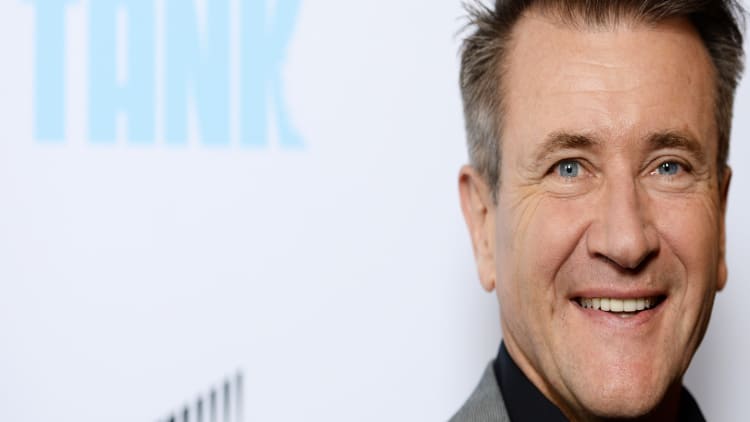Today, Robert Herjavec is a star of ABC's "Shark Tank," the CEO of cybersecurity firm Herjavec Group and a multi-millionaire.
His success is entirely self made: Herjavec's family fled Communist Yugoslavia in 1970 (now Croatia) and arrived in Canada with a single suitcase and $20.
But before becoming an entrepreneur and investor, Herjavec felt adrift as a young person.
"I didn't know what I wanted to do. I was a bit of a mess, partying, hanging out," he says season 9 of "Shark Tank." "People would say, 'What do you want to do with your life?' I'd go, 'Ah, it doesn't matter.'"
But at 21, his father sat him down for a serious talk.
"I went through hell so that you could have the opportunity I never had," Herjavec's father told him. And it gave Herjavec the drive he needed to succeed.
"I had this incredible sense of desperation that if I didn't do something with my life, all the sacrifice wasn't worth it," Herjavec explains to Inc. He landed a job at tech firm called Logiquest, and excelled, becoming president of the company in his 20s. Later, he founded of his own company.
The lessons he learned along the way were hard fought, and there are four keys to success, Herjavec says in a recent blog post, that "I wish I knew back then." And any young person can use them.
1. Earning money is less important than gaining experience
If you're thinking about taking a summer job as a lifeguard or waiter to make extra cash, think again, Herjavec warns.
"I see a lot of young kids in high school and university working odd jobs because they want to enjoy their breaks from school," Herjavec writes on his blog. "That's fine, but in the long run, experience will be what helps you identify your path and find success."
Herjavec suggests prioritizing the professional skills you can learn at a summer gig or internship over the amount of money you might earn.
"Experience is your most valuable asset, so find a job that gives you the experience you need," he writes.
Fellow self-made millionaire and real estate mogul Sidney Torres agrees.
"Intern in the industry you want to be in," he tells CNBC Make It. "Don't worry about what you're getting paid."
Or, instead of working at all, invest your free time in learning a skill, like "teaching yourself a new [software] program," Herjavec writes. "Remember — you are your best investment."
2. Making excuses is a bad habit
"Don't make excuses because nobody cares," Herjavec says. "We've all experienced hardship in our lives, so the biggest mistake you can make is to make excuses for why you can't do something."
Jon Taffer, host of Paramount Network's "Bar Rescue," argues that making excuses is "the common denominator of failure," in his book "Don't Bullsh*t Yourself!: Crush the Excuses That Are Holding You Back."
"If you own the failure and truly blame yourself, you will fight it," Taffer explains. "If you blame an excuse or someone else, you have no reason to change and will continue to fail.
"Own your failures and you will own your success," Taffer continues.
Instead of making excuses, Herjavec suggests young people adopt a problem solving mindset. "Focus on what you need to get the job done — and then go do it!" he writes.
3. Risk-taking can be beneficial
The time to take big risks, "like quitting your job to start your own business," is when you're young, Herjavec says.
"I'm a fan of taking the risks earlier in life, when you likely have fewer responsibilities and more flexibility," he explains, instead of when you have a family to consider.
Taking calculated risks is part of the mindset successful people cultivate, according to "The Top 10 Distinctions Between Millionaires and the Middle Class," by Keith Cameron Smith.
"Millionaires overcome fear with knowledge," Smith writes. "Millionaires educate themselves before taking risks, and then they consider the consequences of failing."
Herjavec agrees on the importance of analyzing risks before taking them. For example, when starting a business, he advises you "test before you go all in, 100 percent, to make sure you have the buy in of a customer base."
4. College helps, but getting to work is key
Student debt reached nearly $1.38 trillion at the end of 2017, according to the New York Federal Reserve. Herjavec suggests young people think carefully about how much education they're willing to pay for.
Though today an undergraduate degree is almost a necessity, that doesn't mean you should spend years and years studying up, says Herjavec.
"Education is critical, but there's no reason to go into massive debt for the 'perfect' degree, or multiple degrees in the same field," Herjavec writes. "Where I get worried is when I see students shying away from putting their degrees to practice in the job market in favor of adding another minor or perhaps a masters.
"Unless you need a specific degree for your career (for example, you're getting a professional certification), your ability, experience, drive etc. are far more important," he continues.
His advice is to get to work, and see how you fare: "I encourage the youth of today to try their hand in their chosen field. Fail. Learn. Succeed. Then decide if you want to pursue further education."
Even billionaire and investing icon Warren Buffett prefers experience over fancy degrees. "I don't care where someone went to school, and that never caused me to hire anyone or buy a business," he says.
Don't miss: 'Shark Tank's' Robert Herjavec is always willing to splurge $15 for valet parking—here's why
Like this story? Like CNBC Make It on Facebook!

Disclosure: CNBC owns the exclusive off-network cable rights to "Shark Tank."


